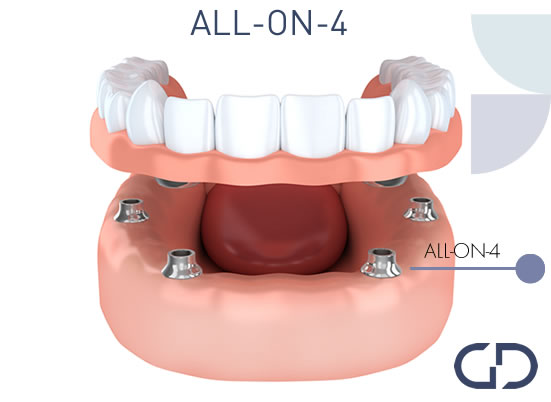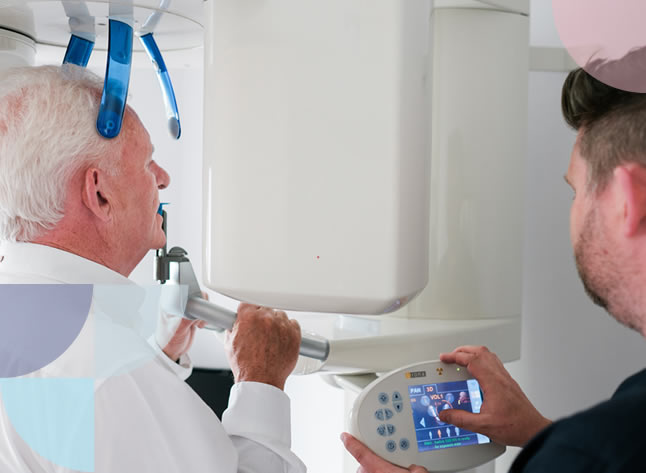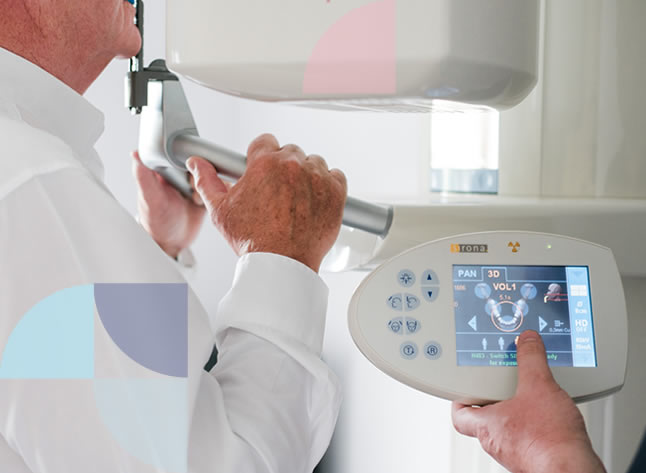
Gum disease, tooth decay and injury can all lead to the loss of your natural teeth. Dentures can replace them and restore your natural smile.
A full set of dentures are traditionally made of an acrylic base (the ‘plate’) and a set of acrylic teeth which fit over your gums. A partial or ‘flexible’ denture is attached to the teeth on either side of a gap- only replacing the teeth that are missing rather than your entire set.
In order to ensure your denture(s) fit as comfortably as possible, your dentist will need to make an impression which they will give to a technician who will then custom build your new dentures.
I spoke to my dentist at Gentle Dental and they took me through all the pros and cons . They helped me make a life changing decision.
New teeth in just one day!
Many people who have full dentures have no problems with them whatsoever but in some cases dentures are loose fitting, sore or cause irritation.
Gentle Dental offers a unique treatment that uses dental implant technology to restore your smile whilst reducing the risk of bone loss. Best of all, you can have a new set of better fitting (and looking!) dentures in as little as just one visit.
All-on-4 uses the placement of four titanium implant anchors which are placed into your jaw, where they will grow into the bone (or integrate) and a temporary bridge is fitted- all in one day.
After about 3 months the implants should be fully integrated and your permanent dentures will then be put in place.
By using our cutting-edge 3D CT scan technology we can ensure that your new teeth will look and feel amazing, have greater stability and last longer than traditional dentures.
The All-on-4 dental implants procedure:



Replacing lost or missing teeth has substantial benefits for your health and appearance. A complete or full denture replaces the natural teeth and provides support for cheeks and lips.
Without this support, sagging facial muscles can make a person appear older and reduce their ability to eat and speak.
No. Bridges and Implants are other options to consider.
Usually dentures can be fitted straight after your teeth have been removed. These are called ‘immediate dentures’. You visit the dentist beforehand for them to take measurements and impressions of your mouth. With immediate dentures you don’t have to be without teeth while your gums are healing.
However, bone and gums can shrink over time, especially during the first six months after your teeth have been taken out. If your gums shrink, your immediate dentures may need relining, adjusting or even replacing. Your dentist will be able to discuss this with you.
Sometimes your dentist may advise you to wait until your gums are healed before having your dentures, as this can sometimes provide a better fit. Healing may take several months.
As with many dental procedure there will be a transition period where you will need to get used to your new dentures. You may find some foods- especially those that are hard or sticky- to be a bit of a challenge and your speech may be temporarily affected.
However, given a little time, patience and practice (as well as a few well placed drops of denture adhesive) you will get used to your dentures quickly.
The base of a denture is called a plate and can be made of either acrylic (plastic) or metal. The teeth are normally made of acrylic and can be made to match your natural teeth. This is especially important in the case of partial dentures.
Dental technologies are always advancing and our highly trained team will help ensure that your new dentures fit comfortably and look as natural as possible. There will be a short breaking in period where you may feel like your dentures appear awkward or too ‘new’ but it will pass quickly.
During the first few days, you may be advised to wear them for most of the time, including while you are asleep. After an initial period of adjustment your dentist may advise that you remove them before going to bed. This allows your gums to rest and helps promote oral health.
Dentures are custom made to fit your mouth and you shouldn’t need a denture fixative. However, over time, dentures may become loose and not fit as well. When this happens, some people prefer to use a fixative for a short time before having them replaced.
A poorly fitting denture may cause irritation and sores. This can often happen if you have worn immediate dentures for some time.
Even with full dentures, you still need to take good care of your mouth. Every morning and evening, brush your gums, tongue and the roof of your mouth with a soft-bristled brush.
This removes plaque and helps the circulation in your mouth. If you wear partial dentures, it is even more important that you brush your teeth thoroughly every day. This will help stop tooth decay and gum disease that can lead to you losing more of your teeth.
Your dentist may refer you to the hygienist to have your remaining natural teeth cleaned regularly.
If you had any natural teeth remaining that needed to be removed before fitting your new dentures, the areas where the extractions were performed may be painful or uncomfortable until they fully heal. However, once your mouth is ready, receiving the dentures is pain free- though you might experience some minor irritation as your mouth gets used to them. This is completely normal.
This is a plate with a number of false teeth on it. It may be all plastic or a mixture of metal and plastic. Both types may have clips (clasps), to help keep the denture in place in the mouth. Depending on where they are, some of these clips may show when you smile or open your mouth.
We recommend that you take your dentures out and clean and store them properly before going to bed. This allows your gums and jaw bones a chance to relax. You should never wear dentures for 24 hours straight without performing essential oral hygiene.
Conventional dentures are made and inserted after teeth have been removed and the tissues have healed. Healing may take several months.
Immediate Dentures are inserted immediately after teeth have been removed. To do this, the dentist takes measurements and impressions of your mouth during a preliminary visit.
An advantage of Immediate Dentures is that the wearer does not have to be without teeth during the healing period. However, bone and gums can shrink over time, especially during the first six months after teeth have been removed. When gums shrink, Immediate Dentures may require relining or even replacing to fit properly.
New dentures may feel awkward or even uncomfortable for a few weeks until you become accustomed to them. The dentures may feel loose while the muscles of your cheek and tongue learn to keep them in place. Should this continue, consult your dentist.
It is not unusual to experience minor irritation or soreness during this period. You may also find that saliva flow temporarily increases. As your mouth becomes accustomed to the dentures, these problems should diminish. If any problems persist, particularly irritation or soreness, be sure to consult your dentist
The general rule is: brush, soak, brush. Always clean your dentures over a bowl of water or a folded towel in case you drop them. Brush your dentures before soaking, to help remove any food debris. Using an effervescent (fizzy) denture cleaner will help remove stubborn stains and leave your denture feeling fresher. Always follow the manufacturer’s instructions. Then brush the dentures again, as you would your own teeth, being careful not to scrub too hard as this may cause grooves in the surface. Most dentists advise using toothpaste and a small- to medium-headed toothbrush. Make sure you clean all the surfaces of the dentures, including the surface which touches your gums. This is especially important if you use any kind of denture fixative. If you notice a build up of stains or scale, have your denture cleaned by your dentist or hygienist.
Over time, your dentures will need to be relined or re-made due to normal wear or a change in the shape of your mouth. Bone and gum ridges can shrink, causing your jaws to meet differently. Loose dentures can cause health problems, including sores and infections, not to mention discomfort. A loose or ill-fitting denture can also make eating and talking more difficult. It is important to replace worn or poorly fitting dentures before they cause problems.
Regular dental check-ups and having your teeth professionally cleaned are vital for keeping your teeth and gums healthy. Most dentists recommend a dental check up at least once a year. Regular visits allow your dentist to check the soft parts of your mouth, including the tongue and cheeks. These examinations are important so the dentist can spot any infections, mouth conditions or even mouth cancer at the earliest stages. Full denture wearers should check with their dentist about how often they should visit. With regular professional care, a positive attitude and persistence, you can become one of the millions of people who wear their dentures with a smile.
Plastic partial dentures are less expensive to make. But unless they are designed very carefully they can damage the teeth they fit against. Metal partial dentures are usually from an alloy of cobalt and chromium and they are much stronger. They are lighter to wear and can be supported by the remaining teeth. Although the base is metal, they have gum-coloured plastic and natural-looking teeth fixed to them. They are more expensive than the plastic ones.
Be guided by your dentist. He or she will know the condition of your remaining teeth. In most cases a metal-based partial denture gives the best result, but the higher cost may make you decide against it.
Different types of denture available are: